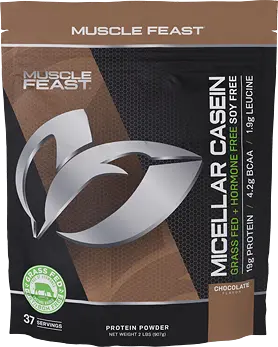Knowledge BaseYou're Questions Answered
Can casein protein powder cause constipation?
Yes, casein protein powder can cause constipation in some individuals. This effect is not unique to casein and can occur with other high-protein supplements as well. Constipation from casein protein typically results from a combination of insufficient fiber intake, inadequate hydration, and the inherent properties of casein protein.
Casein protein, which is derived from milk, is a slow-digesting protein that provides a steady stream of amino acids to the muscles over several hours. While this is beneficial for muscle recovery and anti-catabolism, its slow transit time through the digestive system can contribute to constipation, especially when combined with a low-fiber diet (1).
Several factors associated with casein protein consumption can exacerbate constipation:
- Low Fiber Intake: High protein intake, particularly when it replaces dietary fiber sources like fruits, vegetables, and whole grains, can decrease bowel movement frequency.
- Hydration: Proteins like casein require more water for metabolism and excretion. Inadequate fluid intake can lead to harder stools that are difficult to pass.
- Dairy Sensitivity: For individuals sensitive to dairy, casein can trigger digestive upset including constipation, bloating, and discomfort (2).
To mitigate the risk of constipation when consuming casein protein powders, it is advisable to:
- Increase your intake of dietary fiber. Aim for at least 25 grams of fiber per day as recommended by dietary guidelines.
- Enhance your fluid intake. Drinking sufficient water is crucial, especially when consuming high-protein diets.
- Consider a digestive enzyme supplement or probiotics, which can help improve digestion and regularity.
- If you are lactose intolerant or have a dairy sensitivity, consider switching to a non-dairy protein alternative like pea or soy protein.
Overall, while casein protein is an excellent source of slow-releasing protein, balancing it with adequate fiber and water intake is crucial to prevent constipation and maintain digestive health (3).
- Slavin, J. L. (2005). Dietary fiber and body weight. Nutrition, 21(3), 411-418.
- Hong, G. P., Min, S. G., & Jo, Y. J. (2015). Effects of casein's physicochemical properties induced by various calcium concentrations on the constipation relief. Food Chemistry, 173, 784-789.
- Camilleri, M., Madsen, K., Spiller, R., Van Meerveld, B. G., & Verne, G. N. (2012). Intestinal barrier function in health and gastrointestinal disease. Neurogastroenterology & Motility, 24(6), 503-512.
Related Questions

Your Answer
We are a participant in the Amazon Services LLC Associates Program, an affiliate advertising program designed to provide a means for us to earn fees by linking to Amazon.com and affiliated sites.






